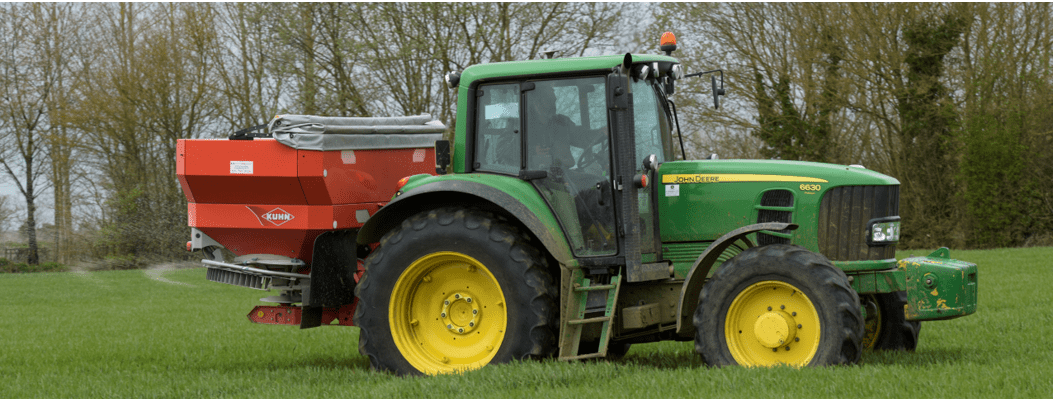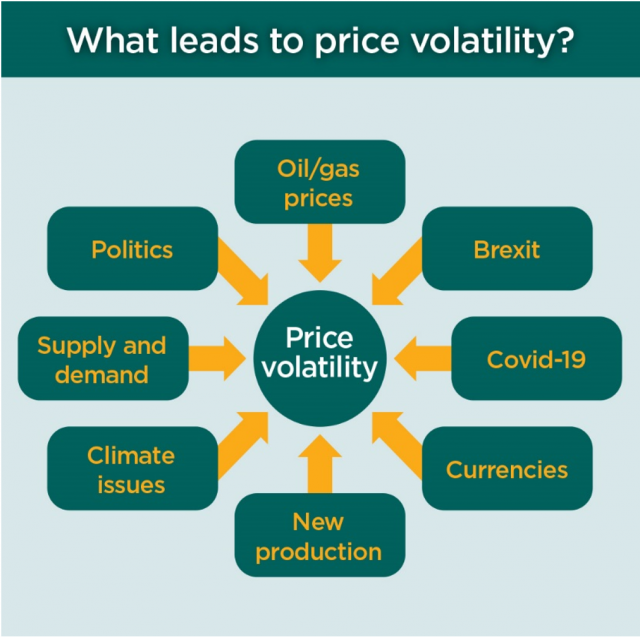Managing the volatility of the fertiliser markets: A look back at the fertiliser market in 2020
The 2020-2021 growing season will be remembered by growers for many things: lockdown, online meetings, the unpredictable weather and volatility in both the grain and fertiliser markets.
The link between grain and fertiliser markets is a complex one. When grain prices are higher, it drives demand for fertiliser. In other words, food security creates demand. However, perhaps over this last year, it has been Covid-19 that has had the greatest impact of all on the high nitrogen values we've seen.
Our fertiliser trading team predicted last year that Brexit and Covid-19 would join the list of key factors influencing fertiliser volatility, along with currency movement, gas prices and shifting levels of supply and demand. In fact, it was all of these factors together that created the market situation we saw last year.
In the summer of 2020, Covid-19 – or, more accurately, lockdown - coupled with warm weather reduced global energy demand and subsequently gas prices fell, meaning nitrogen was cheaper to produce. This short-term cost benefit meant many producers in Europe pushed the plants to capacity (for longer), which in turn lead to inevitable plant breakdowns.
Supply problems began to emerge as early as July and were to continue throughout the year. In March 2021, ammonium nitrate prices were 141% greater than in June 2020.
The key feature of last season was the expected fall in market size due to stocks held on farm from the previous year. Ordinarily, this reduced demand would be a factor in keeping prices in a narrower range between the summer and following spring. However, this was not the case last year; in fact, we saw quite the opposite. The volatility in the market increased cost on a 220kg/ha nitrogen application by over £50/ha.
A rise in the value of energy at the start of 2021 has caused some sharp increases in fertiliser prices this year and it's uncertain whether gas prices will fall back to their summer 2020 levels. We also have to question whether granular urea prices will reduce or whether demand from India will keep them high into the autumn. All of these factors and more demonstrate the complexity of the fertiliser market and the difficulty in predicting how prices will be affected throughout the year.
While the current easing of coronavirus restrictions is a positive development, there are still numerous factors at play in the fertiliser market that may affect how values fluctuate in the months to come. 2020 has certainly taught us to expect the unexpected when it comes to market drivers.
You can take steps to manage your risk
The key buying period for fertiliser in the UK tends to start this month with campaigns by fertiliser manufacturers and importers who offer product at discounted prices for early delivery. For some this is a welcome solution for managing fertiliser purchases but, as is always the case with commodity markets, it doesn't always guarantee the best prices. The benefit of hindsight can be useful but above all, it's important to remember that no two years are ever really the same.
In the same way that risk management strategies are useful with grain markets, having a plan when it comes to your fertiliser purchases is also important. Frontier's risk management tool, Flexi N, can help protect growers from price spikes throughout the season and spread the cost of nitrogen purchases.
Growers who commit can benefit from Frontier's significant buying power to take advantage of a market-averaged cost with the opportunity to split purchases across the season to help manage cash flow.
By using the tool, growers can recuperate considerable savings – an impressive feat when you consider the lack of futures markets to hedge against!
To learn more about Flexi N and to view past performances of the service, please visit our website. If you have questions or would like to enquire about committing to Flexi N, you can contact our nutrition team or speak to your local Frontier contact.
As a subscriber, you’ll receive email alerts each time a new blog is published so you can always stay updated with the latest advice and insights from our experts






Comments